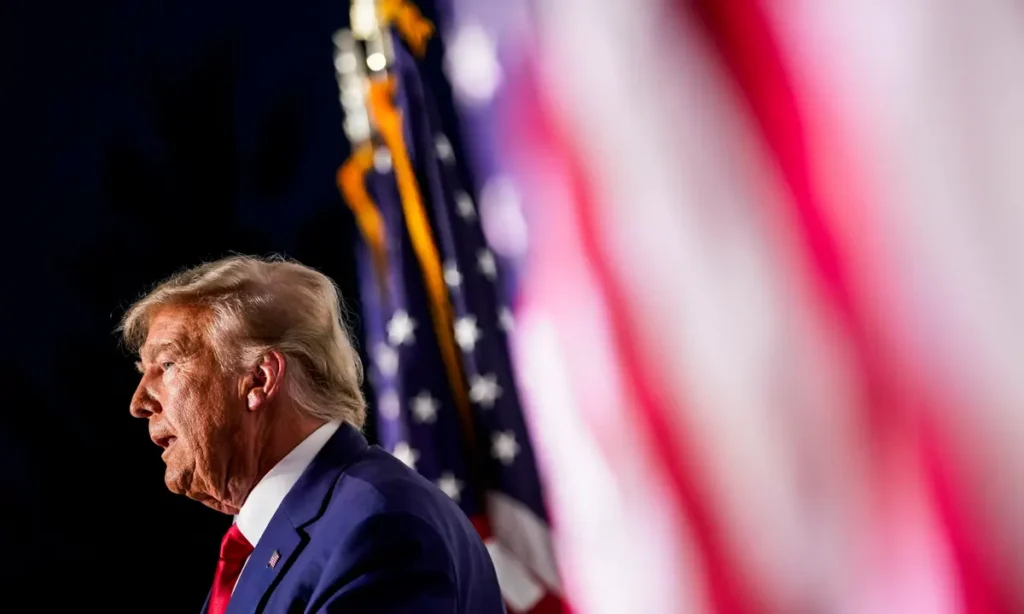The former US President, Donald Trump, has suffered a legal setback as an appeals court has dismissed his claim of immunity in the cases related to the January 6 Capitol riot.

Donald Trump, the former President of the United States, has been unsuccessful in his attempt to evade civil lawsuits. These lawsuits have been filed against him due to his alleged role in inciting the violent attack on the Capitol building by his supporters, which took place on January 6, 2021.
On a recent Friday, a United States appeals court made a significant ruling regarding the immunity claim of the former President. The court dismissed the argument that he should be immune from such lawsuits on the grounds that he was serving as the President.
The court’s decision provides a crucial distinction in the role Donald Trump played during the events leading up to the Capitol attack. It ruled that when Trump urged his supporters to march to the Capitol and halt the certification of his 2020 election defeat, he was not acting in his official capacity as the President of the United States. Instead, he was acting “in his personal capacity as a presidential candidate.”
The court’s ruling further clarified the scope of immunity for US presidents, stating that it only extends to their official actions, not their political activities. This is a significant point, as it delineates the boundary between the responsibilities of the office and the personal political pursuits of the individual holding it.
One of the lawsuits filed against Trump invokes the 1871 Ku Klux Klan Act. This law was enacted in the aftermath of the Civil War, a tumultuous period in American history marked by racial violence and intimidation.
The judicial opinion, penned by the Chief Judge Sri Srinivasan, who was appointed during President Obama’s tenure, and concurred by Judges Gregory Katsas and Judith Rogers, appointees of Presidents Trump and Clinton respectively, articulated a significant point.
Presidents, by virtue of their position, are often seen as performing official duties when they address matters of public interest. However, this is not always the case.
Furthermore, the court clarified that the ex-President retains the right to argue that his actions were carried out in his official capacity.
The court emphasized that as these cases progress in the district court, it is essential that the former President is given the chance to present his own evidence regarding the question of immunity. This opportunity is crucial if he wishes to demonstrate that the actions, which are the subject of the complaints, were carried out in his official capacity as President, rather than in his unofficial role as a candidate.
In other words, the court is ensuring that the former President has the right to establish his own narrative concerning the immunity issue. If he chooses to argue that the actions under scrutiny in the complaints were performed during his tenure as President, he must be allowed to present supporting evidence.
This ruling paves the way for former President Trump to potentially face legal challenges from police officers and lawmakers who were harmed or threatened by his supporters during the riot.
This riot was not a spontaneous outburst of violence, but a calculated attempt to disrupt the democratic process and overturn the results of a free and fair election.
Capitol Police Officer James Blassingame demands a Jan. 6 commission:
"I would think certain things are above politics...[members] say 'thank you for your service, we appreciate what you do,' but they don't.
This is very simple – have a commission to find out what happened." pic.twitter.com/wOSQEWgyTl
— Republican Accountability (@AccountableGOP) June 10, 2021
James Blassingame, a Capitol police officer and one of the plaintiffs in the case, expressed his deep concern and commitment to seeking justice. He stated,
“Even after more than two years, it is deeply unsettling to hear the same distortions and harmful rhetoric that endangered my life and the lives of my fellow officers on January 6, 2021.”
Blassingame’s commitment to pursuing accountability in this matter is unwavering. He hopes that their lawsuit will contribute to restoring our democracy to its rightful path. He emphasized the importance of making it abundantly clear that no individual, regardless of their title or position, is exempt from the rule of law.
Donald Trump, who is currently seen as the frontrunner for the Republican party’s nomination for the 2024 Presidential election, is grappling with a multitude of legal challenges. These challenges extend beyond the realm of civil lawsuits and delve into criminal charges.
The Justice Department has brought criminal charges against Trump, accusing him of attempting to meddle with the 2020 Presidential election. This case is being pursued not only by the Justice Department but also by the District Attorney of Fulton County.
Trump is also the subject of a separate criminal investigation by the Justice Department. This investigation is centered around accusations that Trump mishandled classified information after he left office.
Trump, the 45th President of the United States, is also embroiled in a civil lawsuit brought forth by the District Attorney of Manhattan. This case revolves around alleged hush-money payments made to adult film actress Stormy Daniels.
Furthermore, Trump is facing accusations of fraud from the Attorney General of New York. The charges allege that Trump artificially inflated the value of his assets in order to secure more favorable terms for loans and insurance policies.
ALSO READ | Trump Tackles Campaign Trail at Palmetto Bowl in South Carolina